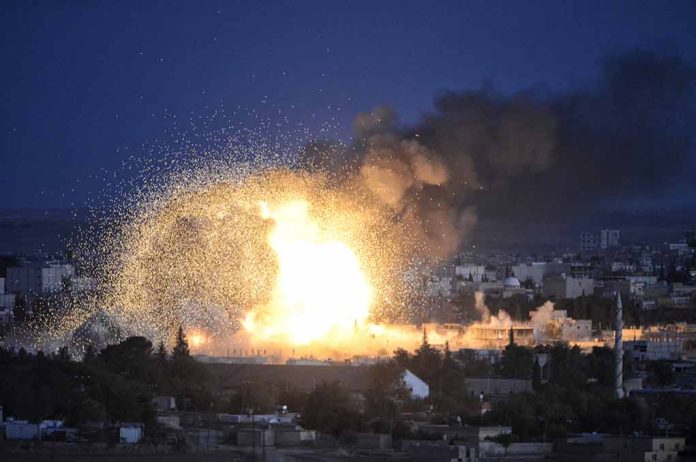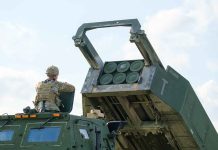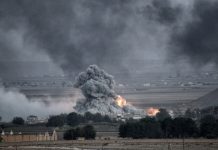
An alleged Russian drone strike on the Chernobyl nuclear plant has ignited fears of a potential radiation disaster, as Ukraine reports damage to the protective structure containing radioactive material from the 1986 catastrophe.
At a Glance
- Ukraine claims a Russian drone hit Chernobyl’s radiation shelter, causing a fire
- The UN’s nuclear watchdog, IAEA, reports normal radiation levels with no leaks detected
- Russia denies conducting the drone attack on the Chernobyl site
- The incident coincides with the Munich security conference discussing the Ukraine-Russia conflict
- Concerns rise over nuclear safety risks amid ongoing military activities near nuclear facilities
Drone Strike Raises Alarm at Chernobyl
Ukrainian authorities have reported a Russian military drone attack on the Chernobyl nuclear plant, compromising a protective structure designed to contain radiation from the 1986 disaster. The strike, which reportedly occurred overnight, caused significant damage and sparked a fire at the site, though emergency crews swiftly extinguished the blaze.
Ukrainian President Volodymyr Zelenskyy has strongly condemned the attack, attributing it to Russian forces and emphasizing the gravity of the situation. The International Atomic Energy Agency (IAEA) confirmed that its staff at the site heard an explosion, raising concerns about the potential for a nuclear incident.
Radiation Levels Remain Stable
Despite the alarming nature of the attack, the IAEA has reported that radiation levels in the area remain normal, indicating no immediate threat of a radiation leak. The agency continues to monitor the site continuously for any potential issues, underscoring the importance of maintaining nuclear safety in the region.
The protective structure at Chernobyl, completed in 2016, covers the original sarcophagus built after the 1986 disaster. Its purpose is to contain radioactive isotopes and prevent their release into the environment. The recent attack has raised questions about the integrity of this crucial safeguard.
Russia Denies Involvement
In response to the accusations, Russia has categorically denied any involvement in the drone attack. The Kremlin dismissed the claims as fabrications, with spokesman Dmitry Peskov stating that Russian military forces do not engage in such actions.
“The Russian military does not do this.”
This denial comes amid ongoing tensions between Ukraine and Russia, with Ukraine accusing Russia of risking nuclear incidents throughout the conflict. The situation is reminiscent of previous concerns raised during the Russian occupation of the Chernobyl plant and conflicts around the Zaporizhzhia Nuclear Power Station.
International Concerns and Diplomatic Context
The drone strike on Chernobyl coincides with high-level diplomatic talks at the Munich security conference, where the Ukraine-Russia conflict is a major topic of discussion. The timing of the attack has raised speculation about its potential impact on ongoing peace negotiations and international efforts to resolve the conflict.
The incident has reignited concerns about nuclear safety in the region, particularly given the increased military activity around nuclear facilities. As the international community grapples with the implications of this latest development, the need for a peaceful resolution to the Ukraine-Russia conflict becomes ever more pressing.






















